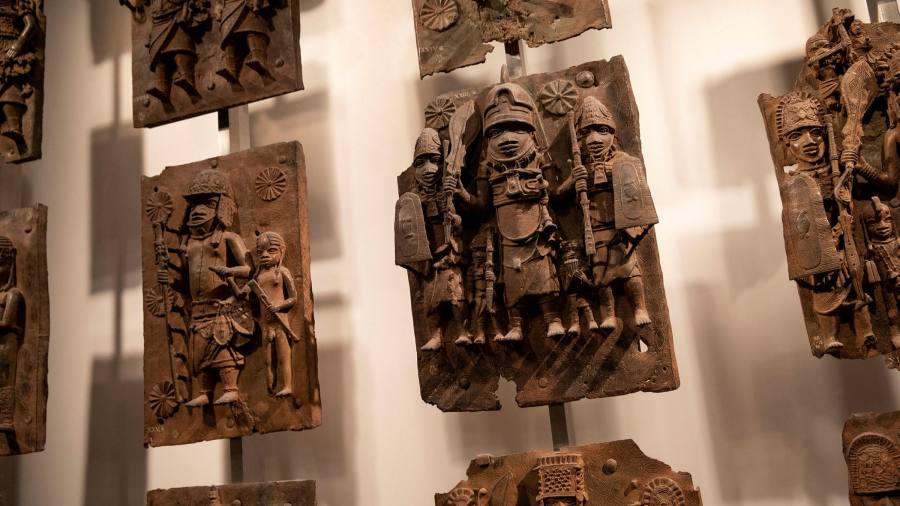[ad_1]
Nearly 125 years after British forces sacked Benin, destroying a centuries-old kingdom in present-day Nigeria, some of the plundered artefacts are to return home — just not those in the UK’s most prestigious museum.
Germany this week said it would begin the process to return hundreds of artefacts from the kingdom, including 440 of the famed Benin Bronzes held at Berlin’s Ethnological Museum. Aberdeen university in the UK also said it would return a sculpture of an oba, or king, that was acquired in an “extremely immoral†way from Benin, in modern day Edo state.
The moves follow decades of agitation for the return of artefacts that have become global symbols of western plunder during colonialism, and the ill-gotten cultural heritage of colonised peoples displayed in museums around the world. The clamour has grown louder as the Black Lives Matter movement has intensified the spotlight on the ills of colonialism and need for restitution.
Germany’s decision was a “major moveâ€, said Victor Ehikhamenor, a Nigerian artist and trustee of the Legacy Restoration Trust that will receive the artefacts. “This is a major institutional return and an entire country finding the right language and having the conscious mind to do the right thing.â€

The restitutions will increase the pressure on London’s British Museum, which holds about 900 Benin artefacts. The museum this week acknowledged the “devastation and plunder wreaked upon Benin City during the British military expedition in 1897†but did not offer to return them.Â
“The strength of the British Museum collection resides in its breadth and depth, allowing millions of visitors an understanding of the cultures of the world and how they interconnect over time — whether through trade, migration, conquest, or peaceful exchange,†the museum said.
Dan Hicks, author of The Brutish Museums: The Benin Bronzes, Colonial Violence and Cultural Restitution, said the statement read like “something out of the 19th centuryâ€.Â
“It’s hard to understand how that narrative really remains, and [how] anyone can say it with a straight face in the 21st century,†he said.
The British Museum declined to comment further. The Department for Digital, Culture, Media and Sport, which promotes the cultural and artistic heritage of the UK, declined to comment.

The Benin Bronzes are a series of exquisite sculptures of animals, people and the kingdom’s rulers, dating from at least the 16th century. Many were commissioned specifically for sacred ritual use. They also include plaques that tell the story of the kingdom that once lined its royal palace. Oba Ewuare II, the current king, has led efforts to recover the bronzes, including a request made during a visit from the British Museum in 2018.
Barnaby Phillips, author of Loot: Britain and the Benin Bronzes, highlighted the role played by the 1963 British Museum Act, which prohibits restitution.
“I’m not saying by any means that the British Museum is desperate to return the Benin Bronzes — it’s not,†said Phillips, a former BBC correspondent in Nigeria. “[But] it is very difficult for the British Museum to give back objects in its collections short of a new law.â€
Hicks estimated that 99 per cent of African objects in UK museums taken under colonialism are in storage boxes, some of which “haven’t been opened for 100 yearsâ€.
But he also said the conversation must extend beyond the British Museum to the roughly 160 institutions worldwide that hold Benin’s treasures.

The British Museum is one of those working with the Nigerian authorities on a new Edo Museum of West African Art in Benin City, designed by Sir David Adjaye, the Ghanaian-British architect, to which it could loan some of the bronzes in its possession.
Enotie Ogbebor, a local artist, said the return of the artefacts was crucial not just because many were sacred, but for what their presence would say to young Nigerians.
“The mindset of our people has been distorted through colonialism . . . [that] we have no history, that we’re just a bunch of savages,†he said. “So with the return of these artefacts you’re going to see an increased recognition of who we are as a people and what we’re able to achieve.â€
The restitution movement is gaining steam. France’s parliament has voted to return African artefacts, including those at the Musée du Quai Branly — Jacques Chirac in Paris, though not the Benin Bronzes held there. The Netherlands also plans to repatriate artefacts to its ex-colonies, including Indonesia and Suriname.
Restitution is also not a new idea. There was widespread restoration in the 1990s of goods looted during the Holocaust. There have also been efforts at restitution of goods taken from native Americans and the Maori in the South Pacific.
The plans for a new Edo museum will in part answer the argument long made in the west: that developing countries do not have the facilities to keep the priceless art safe. Ehikhamenor dismissed the premise.
“If somebody comes to your house and steals one of your heirlooms, it would be a bit disingenuous for them to then turn around and ask you, what are you going to do with this?
“It’s like going to Buckingham Palace, ripping the paintings off the walls and when the owners question the intruders, they would ask if the original owners are sure they can take care of them.â€
Additional reporting by James Pickford in London
[ad_2]
Source link






